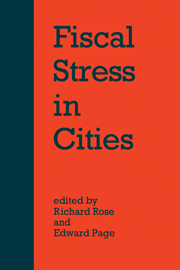Book contents
- Frontmatter
- Contents
- Acknowledgments
- 1 Can Government Control Itself?
- 2 Pressures in Whitehall
- 3 Pressures from Whitehall
- 4 The Decline of Urban Economies
- 5 Local Government as an Employer
- 6 Do Fewer Pupils Mean Falling Expenditure?
- 7 Local Autonomy and Intergovernmental Finance in Britain and the United States
- 8 Chronic Instability in Fiscal Systems
8 - Chronic Instability in Fiscal Systems
Published online by Cambridge University Press: 07 October 2011
- Frontmatter
- Contents
- Acknowledgments
- 1 Can Government Control Itself?
- 2 Pressures in Whitehall
- 3 Pressures from Whitehall
- 4 The Decline of Urban Economies
- 5 Local Government as an Employer
- 6 Do Fewer Pupils Mean Falling Expenditure?
- 7 Local Autonomy and Intergovernmental Finance in Britain and the United States
- 8 Chronic Instability in Fiscal Systems
Summary
Manage v.t. To have effective control of,
bend to one's will…to manage a horse
Oxford English DictionaryTo speak of controlling public expenditure is to assert what remains to be proven. For the Treasury to control public expenditure it would need to control not only the state of the economy as a whole but also spending and revenue-raising by central government, local authorities and nationalised industries. Insofar as this is difficult, the Treasury could maintain the appearance of control if it predicted what would happen to the fiscal system each year, and adopted these predictions as its own policy goals. As long as the outcome was as predicted, the correlation between what happened and what the Treasury proposed would be consistent with a claim of Treasury authority.
But in turbulent times predictability, the holy grail of social scientists, is easier sought than attained. Insofar as the chief determinants of a fiscal system cannot be predicted, then central as well as local governments must make fiscal decisions that are very uncertain of realisation. Instability can become a chronic condition rather than a merely transitory phase of public finance. The object of this chapter is to demonstrate that local government fiscal systems are now best described as chronically unstable rather than incremental in their principal financial characteristics, to explain why instability occurs when the desire for predictability is great, and to consider problems of coping with a fiscal system that cannot be controlled.
- Type
- Chapter
- Information
- Fiscal Stress in Cities , pp. 198 - 245Publisher: Cambridge University PressPrint publication year: 1983

